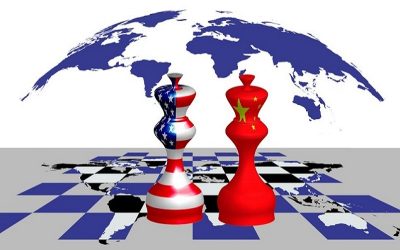Uncertain Future of US-China Relations: Biden’s Envisioned “Extreme Competition” with China

All Global Research articles can be read in 27 languages by activating the “Translate Website” drop down menu on the top banner of our home page (Desktop version).
***
US President Joe Biden told CBS New during his first TV interview since the inauguration that he envisions an “extreme competition” with China but doesn’t believe that that this will evolve into an actual conflict. He also shared a mixture of praise and insults about Chinese President Xi. Biden claims that he’s spent more time with his Chinese counterpart than any other world leader, which is why he regards President Xi as “very bright” and “very tough”, but also said that “he doesn’t have a democratic bone in his body”. Biden then continued by saying that President Xi is sending him unspecified “signals”, which is why the American leader won’t treat China the way that former President Trump did but will instead try to “focus on international rules of the road”.
The 46th President’s remarks don’t inspire confidence about the future of Chinese-US relations. There were earlier high hopes that he’d change the hostile course of his predecessor in order to enter into a meaningful rapprochement with China. Those expectations were gradually dashed as his officials continued the trend of bashing China and reaffirming the US’ government’s threat assessment of it as their top strategic competitor. Nevertheless, their perceived competition could still be regulated so long as the US has the political will to do so, yet it doesn’t appear as though the Biden Administration does. After all, it already takes it for granted that the two countries will remain locked in what he described as an “extreme competition”.
This very strongly suggests that the only changes to its grand strategic approach will be cosmetic. Biden hinted as much during last week’s foreign policy speech at the State Department, which represented his desire to disguise American aggression behind the rhetoric of alliances, democracy, and values. He seems to have referenced them with his quip about the “international rules of the road”, which looks like a euphemism for attempting to manipulate those three for the purpose of strengthening the US’ strategic position against China. Biden thinks that the extensive time that he spent with President Xi as Vice President means that he knows him better than anyone else, but he’s terribly mistaken based on the assessment that he made about China.
If Biden really knew President Xi as well as he thought, then he wouldn’t have taken their countries’ “extreme competition” for granted. In fact, one doesn’t even have to know the Chinese leader personally to be aware that this is the wrong conclusion to make. President Xi and the Chinese government that he represents have repeatedly called for the US to deescalate tensions and always reminded their counterparts of their will to immediate reciprocate any goodwill gestures to this end. While it’s welcome that Biden doesn’t want to treat China the same way that Trump did, this doesn’t mean that he’s going to change the substance of America’s aggressive strategy towards the People’s Republic, but only its style.
There is as yet nothing to suggest that Biden is serious about resolving the many problems that he inherited between the US and China. To the contrary, his administration only seems interested in exacerbating them, albeit under the pretext of alliances, democracy, and values (collectively referred to by euphemism as “international rules of the road”). This explains why his government has continued former Trump’s policy of meddling in China’s internal affairs in Taiwan, Hong Kong, Xinjiang, and the South China Sea. Instead of being as direct as the former president was about what the US is doing and why, Biden appears to be taking a page from his boss former President Obama’s book by disguising his hostile intentions behind high-sounding rhetoric.
Sometimes dishonestly posing as a friend like Biden is trying to do by relying on his extensive experience of private meetings with President Xi to justify the completely mistaken conclusions that he shared about China is worse than proudly embracing the role of an adversary like former President Trump had done. If there was any silver lining to Trump’s presidency, it’s that his unpredictability was itself predictable, which led to accurate predictions that he’d isolate the US through his aggressive unilateral actions aimed at containing China. Biden, however, is trying to sweet-talk the international community with alliances, democracy, and values to get them to support the US against China, which is a much more pernicious policy that must be urgently exposed.
*
Note to readers: please click the share buttons above or below. Forward this article to your email lists. Crosspost on your blog site, internet forums. etc.
This article was originally published on OneWorld.
Andrew Korybko is an American Moscow-based political analyst specializing in the relationship between the US strategy in Afro-Eurasia, China’s One Belt One Road global vision of New Silk Road connectivity, and Hybrid Warfare. He is a frequent contributor to Global Research.
Featured image is from OneWorld




Geen opmerkingen:
Een reactie posten